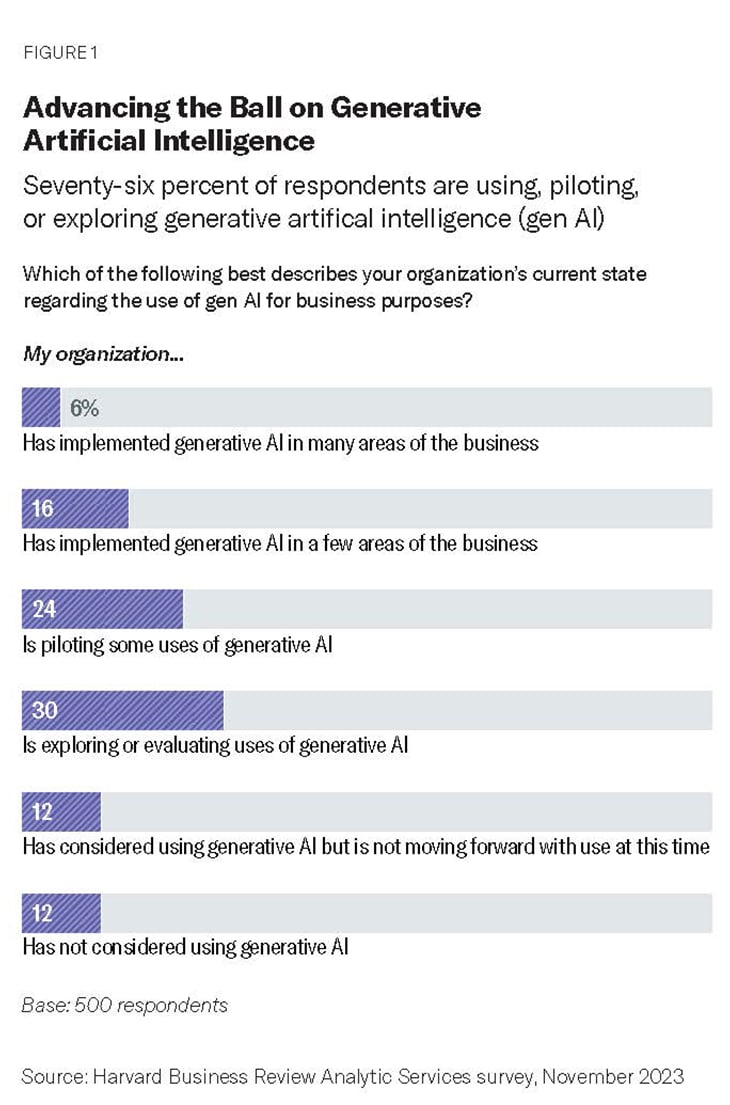Unveiling the top three findings on operationalizing generative AI
Juli 9, 2024 / Unisys Corporation
Short on time? Read the key takeaways:
- Employee productivity is the top driver motivating organizations to explore generative AI and is notably higher than other reasons like developing new capabilities or reducing costs.
- Computing power, talent, and complexities involved in AI management can strain budgets if not factored in prior to implementation.
- Adoption of generative AI is poised to accelerate significantly in the next 12 months with respondents anticipating their organization's AI investment will increase in this timeframe.
- To successfully operationalize generative AI, organizations must navigate challenges related to payroll costs, resource allocation and ensuring responsible use of the technology.
Generative AI could transform entire industries. Companies that benefit most will be those that operationalize it to achieve business outcomes. But how can they do this effectively?
According to the results of Harvard Business Review Analytic Services’ 2024 report “Operationalizing Generative AI for Better Business Outcomes,” sponsored by Unisys, approximately 73% of respondents expect generative AI to be significantly or extremely valuable to their organization. And 76% say their organization is already using, piloting, or exploring generative AI for business purposes.

For the report, Harvard Business Review Analytic Services surveyed more than 500 executives/board members, senior/middle managers and others familiar with their organizations’ current use of generative AI and their decision-making around the technology. These professionals work at organizations in technology, education, financial services, professional services, government, and healthcare around the globe.
Generative AI can empower your workforce and take you far beyond task automation. As you navigate the adoption of generative AI, the perspectives of other organizations grappling with questions around technology can provide comfort and inspiration. Here are three of the top findings from the Harvard Business Review Analytic Services survey to inspire your own artificial intelligence (AI) adoption journey.
Finding #1: Employee productivity is the top driver for AI exploration
When considering the value of AI, organizations are most interested in boosting employee productivity. Sixty-seven percent of respondents say that the primary factor motivating their organization’s exploration of gen AI is to improve employee productivity and efficiency. That is notably higher than the other reasons cited, including to develop new capabilities/innovations (cited by 45%), to better use data (32%), to reduce operational costs (30%) and to improve customer engagement (27%).
And these ambitions appear to be coming true, with improved productivity/efficiency as the most touted benefit of those that have adopted generative AI (cited by 42%), followed by the ability to develop new capabilities/innovations (34%) and better utilization of data (29%).
But prioritizing your objectives–whether they involve increasing productivity, decreasing expenses or something else entirely–is paramount to a successful outcome. Some organizations focus on AI capabilities first and then consider how to use them internally. However, it’s worth considering areas that could drive the most success before deciding how AI could improve the related processes.
Learn more: Read the report to learn the other motivating factors and realized benefits shared by respondents for AI adoption.
Finding #2: Organizations underestimate AI implementation costs
While many organizations recognize the potential of generative AI, not all of them are benefitting from it yet. Only 41% of survey respondents agree that their organization is realizing a positive ROI from using gen AI. And few organizations have benefitted from generative AI in areas like reducing operational costs (20%) and increasing sales/revenue (11%).
One reason for this discrepancy between AI’s promise and its reality is the cost of developing and maintaining AI technologies, which can eat away any financial boon. For example, the computing power necessary to process user queries and the required talent for AI management can strain budgets if not factored into the equation from the beginning.
Yet opting for something seemingly simple, such as implementing a chat interface, might seem to be a more straightforward and less costly initial path, as one participant noted. But it’s important to dig deeper into the potential costs and uncertainties involved. Since this is a relatively uncharted area, many of the complexities involved are not yet fully understood.
This means that the organizations most well-positioned to benefit from generative AI will be those that perform a cost-benefit analysis that probes all potential expenses beyond the initial setup. The combination of a set strategy, a solid business case and clear ROI objectives creates the most promising way forward.
Learn more: Explore the report to learn the next steps organizations are taking to achieve ROI on gen AI.
Finding #3: The next 12 months will be huge for AI adoption
Despite the uncertainty around how to implement generative AI, there’s no question among respondents about when this investment will occur. Seventy percent of respondents anticipate the overall financial investment in generative AI increasing over the next 12 months.
To be able to invest effectively, however, organizations must overcome several challenges. Among them are the cost of hiring AI prompt engineers, the allocation of resources to the most promising AI projects and the responsible use of AI.
Learn more: Read the report for details on emerging, innovative ways to weigh gen AI’s risks and rewards.
Embark on your own generative AI journey
This survey uncovered valuable insights into how executives are weighing the business opportunities for generative AI. Whether you’ve already adopted AI tools or are first considering promising uses for the technology, these insights can help you achieve success. Download the report to learn what executives around the world have to say about their organizations’ generative AI journeys. And explore how AI-powered solutions from Unisys help you move beyond the hype to realizing AI’s true value.


























